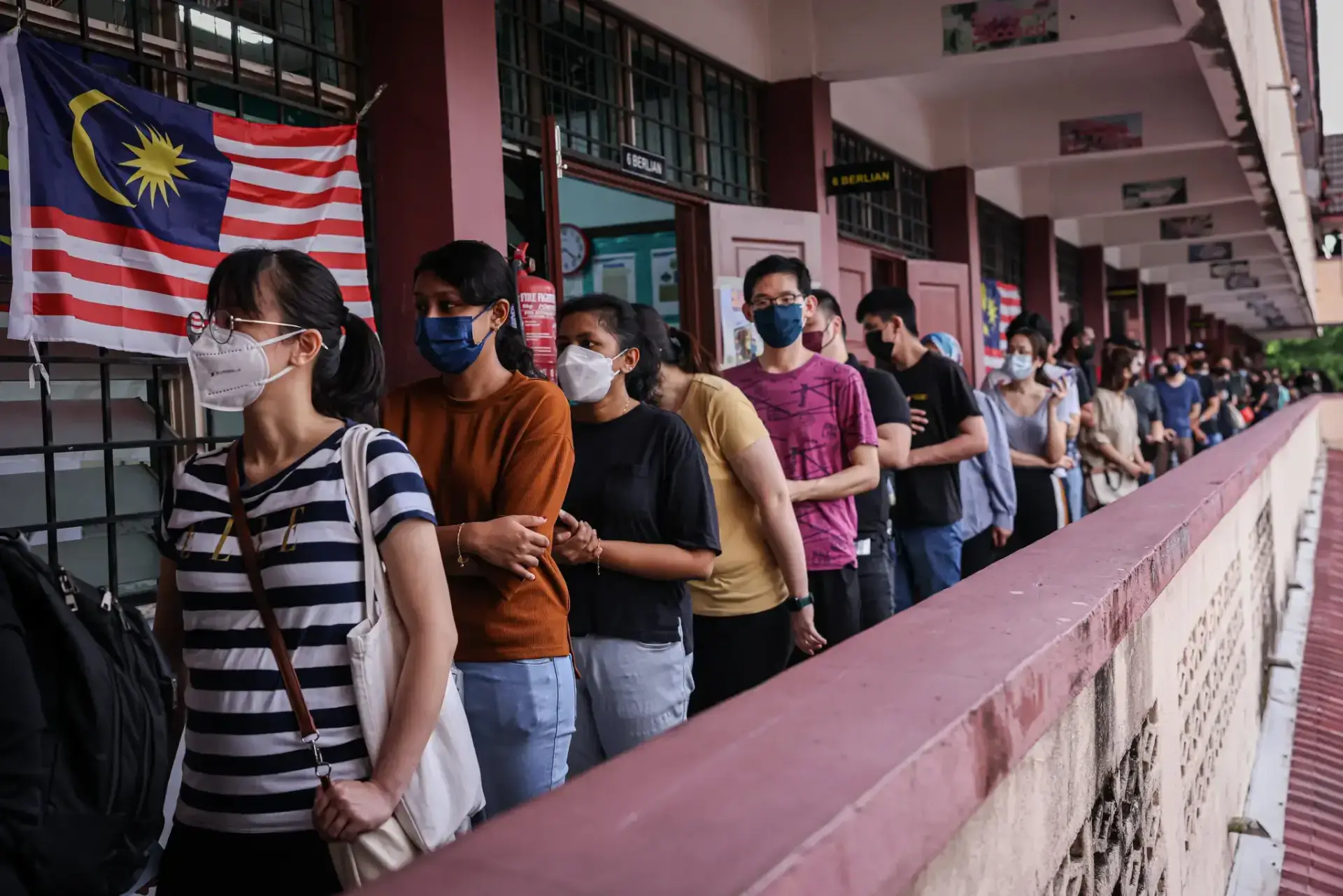Malaysia has spiralled into a new period of political uncertainty after the country’s 15th general election (GE15) failed to produce a clear winner, prompting competing parties to scramble for support to broaden their coalition and secure a majority.
In the closely contested election, whose results were announced on Sunday, opposition leader Anwar Ibrahim’s People’s Justice Party led-alliance secured the highest number of parliamentary seats, with 82 out of 220. However, he fell far short of a clear majority, which requires a minimum of 111 seats.
Meanwhile, former Prime Minister (PM) Muhyiddin Yassin’s Perikatan Nasional (PN), which leads the country’s Malay movement, trailed close behind with 73 seats.
Massive crowd despite the heavy rain last night#MalaysiaMemilih pic.twitter.com/Gj1kgiH39z
— Shamil Norshidi (@s_norshidi) November 13, 2022
Surprisingly, the race’s biggest upset was PM Ismail Sabri Yaakob’s ruling Barisan Nasional (BN) coalition, comprising centre-right parties including the dominant United Malays National Organisation (UMNO). UMNO, which ruled the country since its independence from the United Kingdom (UK) from 1957 until 2018, won just 30 seats.
Rural Malays, who comprise two-thirds of the country’s 33 million population, which also includes a large community of ethnic Chinese and Indians, have feared losing their rights under increased pluralism. This, combined with rampant corruption under UMNO, has played greatly to Muhyiddin’s advantage.
Another PN ally, the Pan-Malaysian Islamic Party (PAS), secured a whopping 43 seats, due to its strong Muslim support base.
Another big loser of the race was two-time former PM, 97-year-old Mahathir Mohamad, who lost his seat in the Langkawi island constituency, marking his first electoral defeat in over 50 years. He said, however, that he would not form an alliance with any “crooks or jailbirds,” a reference to UMNO, the party of former PM Najib Razak, who is in jail on a series of corruption charges over the 1MDB scandal.
Rain or shine, voters in P104 Subang Jaya are not missing out on their chance to vote in the #GE15.
— Nailah Huda (@nylahuda) November 19, 2022
Pretty nostalgic for me to be back in my old stomping grounds for the first time since I left this school in 2013.#MalaysiaMemilih pic.twitter.com/jelVSqBue6
The convoluted outcome in GE15 has resulted in horse-trading between parties, as Muhyiddin and Anwar both scramble to form the government. However, in order to do so, UMNO has ironically emerged as the tie-breaker.
Due to the lack of a clear winner, Malaysia’s constitution grants the King powers to assess who has the majority in parliament. Malaysia’s monarch, Sultan Abdullah Billah Shah, had decreed that leaders of political parties must inform the palace of their coalition agreements by Monday afternoon in order to help make the decision. However, politicians have been granted a one-day extension by the King to gain more clarity.
Although both Anwar and Muhyiddin claim to have the necessary support to form government, they have not yet disclosed their allies. To this end, former leader Muhyiddin has said that he will show statutory declarations (SDs) signed by members of Parliament (MPs) on Monday as proof of his coalition’s support base.
CONTEXT:
— Ibrahim Sani (@ibrahimsaninet) November 21, 2022
New Perak MB says the reason why BN agreed to go with PH to form the state gov is because PH agreed to make BN the MB, Speaker, and other key roles.
This is minority leadership. Big concessions made by PH to be in Perak state gov.
GE15:
PN26
PH24
BN9#MalaysiaMemilih
The winner of the election will become the politically volatile country’s fourth PM in four years and will be expected to manage the rising cost of living and high inflation.
Analysts believe that the hung Parliament situation will only worsen economic uncertainty in the country. Economist Carmelo Ferlito, head of the Center for Market Education, told the media that the situation “will create nervousness in the market.”
“We can expect turbulence where the ringgit and the stock market is concerned,” he said.
Anwar says the issue of BN Chairman Zahid Hamidi's anticipated charges were not raised at all during the discussion.#MalaysiaMemilih
— Nailah Huda (@nylahuda) November 21, 2022
Alexander Chia, head of regional equity research at RHB Bank, added that the current outcome “constitutes a worst-case scenario for markets,” as “investor sentiment [is] likely to remain clouded... depending on the duration of the power vacuum, the quality of the Cabinet members, and the parliamentary majority of the eventual government that will determine its ability to institute reform.”
Against the backdrop of fluctuating leadership, many voters have expressed hope to see an end to the years of political instability. The Election Commission estimates that voter turnout on Saturday was huge, recorded at almost 74% despite heavy rains and flooding that has hindered campaigning in recent weeks.
Malaysia has been plagued with severe political instability in recent years, witnessing three administration changes since 2018, when Mahathir, who led the country from 1981 to 2003, briefly returned to power in 2018 after breaking UMNO's stranglehold on power with his Pakatan Harapan coalition.
BREAKING: Istana Negara has extended the deadline to 2PM tomorrow. pic.twitter.com/4YRspy3qze
— Nailah Huda (@nylahuda) November 21, 2022
However, he was forced to resign after fractures within the coalition widened, allowing UMNO to come back to power with Muhyiddin Yassin, in power from March 2020 to August 2021, at the helm.
Muhyiddin, too, was forced to resign after a tumultuous 17 months in office after allied parties withdrew their support, paving the way for Ismail Sabri to enter office until he dissolved the parliament in October and called for fresh elections in a bid to widen UMNO’s lead.

